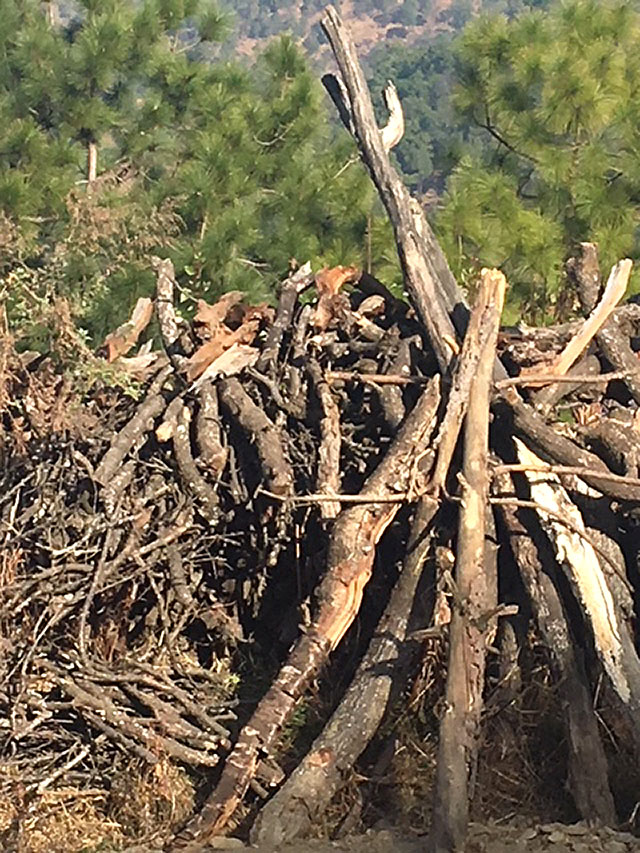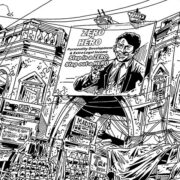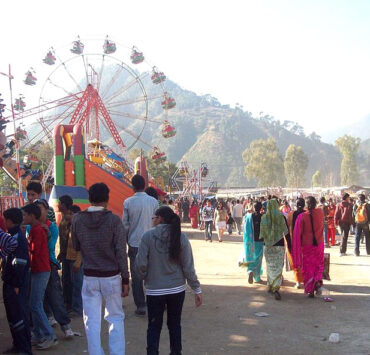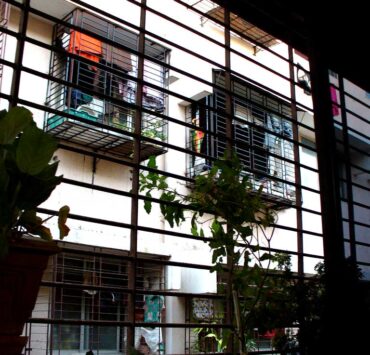On a ledge of dried grass overlooking a pine forest, behind which the Himalayan peak called Nanda Devi beamed white with snow, she waited. What’s taking those two so long, she thought, fiddling with a stray strand of grass. It was best to collect firewood in the daytime, and with winter a rainfall away, the work needed to be done quickly, before the cold paralysed the village. Tara didn’t have time to waste, and this, sitting and waiting, was wasting time.
She saw a group of women returning with bundles of branches. She whistled to them. They whistled back.

A cold home is a dead home. Photograph by Pragya Bhagat.
“Have you seen Radha!”
“Who’s Radha!”
Tara continued to wait, ready to attack the missing with anger. After what seemed like a very long time, she heard someone whistle.
“Die, you crazy women! Do you know how long I waited?”
Two figures walked towards her, laughing.
“You can’t have been waiting that long,” one of them called out, “we’re just a few minutes late.” She was the shorter of the two, her face small, her hair tied in a bun.
“You be quiet, Radha. I’m sure it was Kamla’s fault.”
“Of course, all the blame must come to me every time. Now what do I do, sister? My mother-in-law wouldn’t leave me alone.” Kamla’s eyes were honey brown, her dusky cheeks ruddy with the blush of winter.
“Now if it was her husband,” Radha chimed, “she wouldn’t be so apologetic.” The three women guffawed.
“I can’t relate,” Tara said, “the situation is different at my home. He and I are not speaking to each other.”
“Another world war is coming, each side smarter than the other,” Radha said, “now the next chapter of their dramatic love story will unfold.”
“You be quiet,” Tara said, “how many kids do you have again? You and bhaiya have more passion than all of us combined.” She winked at Kamla.
“That operation saved me, otherwise we would have twice as many.”
“I know, I know,” Kamla said, “you must be so happy now that you can focus your full attention on what’s important.” They laughed, loudly, freely. There were no men around, no relatives, no children. This, the steep path to the forest, was their brief escape to a world free of judgment.
“Be careful, sisters,” Kamla called out as vines studded with thorns pulled on their clothes. “You know what they say about thorns tugging on your clothes.”
“That wife number two is on her way? He’s free to bring her home,” Tara said. “What will she do other than comb her hair and apply lipstick while I fetch wood?”
“He’ll leave her,” Radha said, “when he realises she’s not bringing any wood to warm the house. A cold home is a dead home.”
“Oh, but she’ll make sure to keep him warm,” Kamla giggled, “in bed!”
“Chi, Kamla,” Tara grimaced, “you and your dirty mouth. Your husband must be well versed with your filth by now, eh?”
“He loves it,” Kamla grinned, her pink cheeks bright against the afternoon sun, “he can’t get enough. Though around my mother-in-law it’s a different matter.” She placed the tail of her sari on her head, mimicking servility. “Yes, mother. Okay, mother. Whatever you say, mother. Your good-for-nothing son is the best husband anyone could have, mother.”
“Stop your chatting,” Radha said, “and watch your step.” The low-grassed hills had transitioned into a dense wood; they bent under gnarled vines and around hollow tree trunks. The women continued to chatter at a distance, each looking for dead wood to hack. Tara stepped over bushes, past low-hanging branches, away from thorned vines that clung to her cotton kurta, and towards thick branches that she struck with a sickle. The hollow crack of a dead tree indicated ideal firewood, anything else was left alone. Tara stepped up on a ledge, landing her shoe in dark muck.
“There’s mud here,” she bellowed. Faint shrill voices replied wordlessly. One wavering step at a time, Tara made her way up the swampy hill, her cloth shoes sinking deep in the dampness.
“My shoes are covered in shit,” she laughed. Laughter echoed back at her.
Beyond the muck, Tara found a dead tree, and she climbed up its thorned trunk, hacking fiercely at the branches that fell drunkenly to the wet, leaf-littered ground. Thorns scratched her skin and tore her kurta but the torn skin wouldn’t sting until tomorrow and the state of her clothes would soon be cause for laughter. Nearly an hour passed till the women were ready to leave.
“Look at my kurta,” Tara said, twirling to showcase rips in the front and rear.
“Look at that ass, what style,” Radha said, “look at my legs.” She lifted her blue petticoat to reveal lanky, pale legs, reddened with scratches.
Not to be outdone, Kamla stuck her arms out. “Nice and bloody, now we’ll have good fun when water hits these wounds.”
“I’m not bathing till tomorrow,” Tara said, “but I’ll have to wash my feet.” She wiggled her shoes, caked in black grime. The women laughed some more at the condition of their bodies, but it was not a deprecating laugh; they were truly enjoying themselves.
Tara placed the thicker branches on the bottom of her pile and one by one, stacked the thinner sticks on top. Next, she brought the two ends of her nylon rope around the pile of wood and knotted it snugly, using her body weight to further tighten the rope. She placed a roll of cloth on her head and bent low, allowing Radha to lift the pile of wood onto Tara’s head. Radha grunted from the weight as she did so. In this manner, the women helped each other with their wooden bundles and began the slow return to their village.
Tara’s head remained still, her hips swaying to maintain balance. Conversation was sporadic as they panted on the steep uphill climb. A light throbbing pulsed atop Tara’s head, but she was used to it by now. At the top of the hill that joined onto a wide laid out path, the women dropped their loads on the grass and rested. On the other side of the hill coldness would have set in, but here they enjoyed the heat of the sun on their backs.
After this, the rest of the walk would be easy, but life would once again become a performance. Food would be cooked, grass would be cut, children would be fed, husbands would be satisfied. But in this moment, as they sat on the pebbled road with their bundles of wood, joking and laughing till their throats wheezed, arranging the time and place for tomorrow’s meeting, the three women experienced the contentment of friendship.








